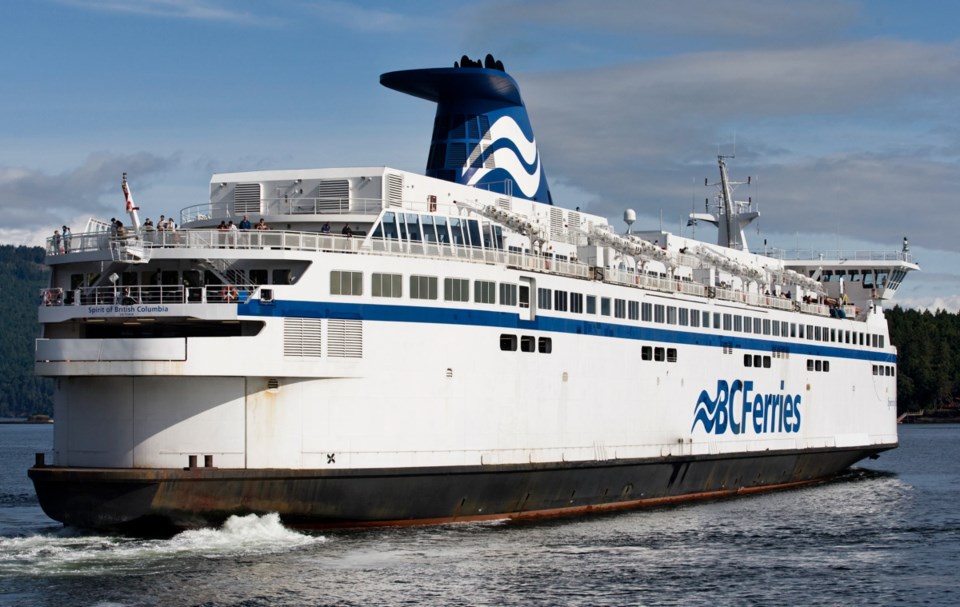One Canadian and two foreign shipyards have been shortlisted for the job of converting B.C. Ferries’ two Spirit-class ships to dual-fuel systems and completing their mid-life upgrades.
The three are Seaspan’s Drydock in North Vancouver, Remontowa SA of Poland, and the Italian company Fincantieri’s ship conversion yard in Palermo, Italy.
The project has been pushed back a year to give B.C. Ferries more time to work out complex details for the Spirit of British Columbia and the Spirit of Vancouver Island, the corporation announced Thursday.
Under the new schedule, the Spirit of British Columbia would be out of service between fall 2017 and spring 2018. Work on the Spirit of Vancouver Island would be carried out in fall 2018 through spring 2019.
It was not a difficult decision to change the timeline for a project affecting vessels on B.C. Ferries’ busiest route, said Mark Wilson, the corporation’s vice-president of engineering.
These are such important ships on the Tsawwassen- Swartz Bay routes that “we need certainty around the engineering, we need certainty around the schedule, and we need certainty around the procurement times for proper project management. So we need that time,” he said.
Work will be performed outside of the peak season, he said.
Negotiations with the three yards will be carried out in the next few months, B.C. Ferries said. The winning bidder is expected to be announced by late fall this year.
Work would most likely be carried out at the location of the winning yard.
Contracts of this scope attract shipyards from around the globe. The three yards were selected from a group of five, with the others in Singapore and Italy. Originally, 22 yards expressed interest, Wilson said.
Spirit vessel project costs are expected to be slightly greater than the contract cost of the three new intermediate-class dual-fuel ferries now being built by Remontowa in Poland, he said. That contract is worth $165 million.
B.C. Ferries said it would factor in delivery costs when comparing offshore bids to Seaspan’s.
Remontowa’s ship-repair and conversion yard, one of the Spirit project bidders, is geographically close to where the new ferries are being built, Wilson said.
B.C. Ferries is converting the Spirit ships to a dual-fuel system, meaning they will run largely on liquefied natural gas and also have the capability to use low-sulphur diesel fuel.
Not only is LNG a greener fuel, it is estimated that the Spirit conversion will save $9 million annually in fuel costs, Wilson said.
The mid-life upgrade is expected to add at least 20 years to the service life of the Spirit-class vessels, Wilson said. Spirit ferries are 560 feet long and can carry 2,100 passengers and 470 vehicles.
B.C. Ferries is looking for particular expertise for its Spirit project. “Ideally, I would love a bunch of yards with experience in shipboard LNG conversions,” Wilson said. However, in the world market, there is not much experience with such conversions, he said. Yards more typically have expertise in building new ships powered by LNG, or in complex conversions that do not necessarily involve LNG.
Brian Carter, president of Seaspan Shipyards consisting of Vancouver Shipyards, Vancouver Drydock and Victoria Shipyards in Esquimalt, said that winning the bid would result in about 150 jobs at the Drydock.
Seaspan Ferries Corp., which carries freight traffic, has ordered two new dual-fuel vessels from a shipyard in Turkey, which will help bolster the company’s own LNG capability. “Our shipyards will maintain those [vessels], so we are working closely with the supplier community to develop expertise in that equipment, that would augment our existing conversion capability,” Carter said.
If Seaspan wins the B.C. Ferries contract, it would be its first LNG conversion, he said.
Seaspan is already building large non-combat ships for the federal government at its Vancouver Shipyards. The ability to develop additional expertise in B.C. is seen as one of the key benefits of this work. Similarly, the Spirit work would build LNG expertise on this coast.
“That’s a great potential future market for us. It would be a great win for the region and bring a lot of capability to the region. We are going to see LNG-powered vessels operating here, so having existing infrastructure in place to service those vessels is really going to be important,” Carter said.
Now that B.C. Ferries has extended its start date on the Spirit project, “we are going to take a look at where it makes best sense for us to do the work, based on the new schedule. But our repair and conversion and engineering folks from Victoria would undoubtedly play a role in the work.”



